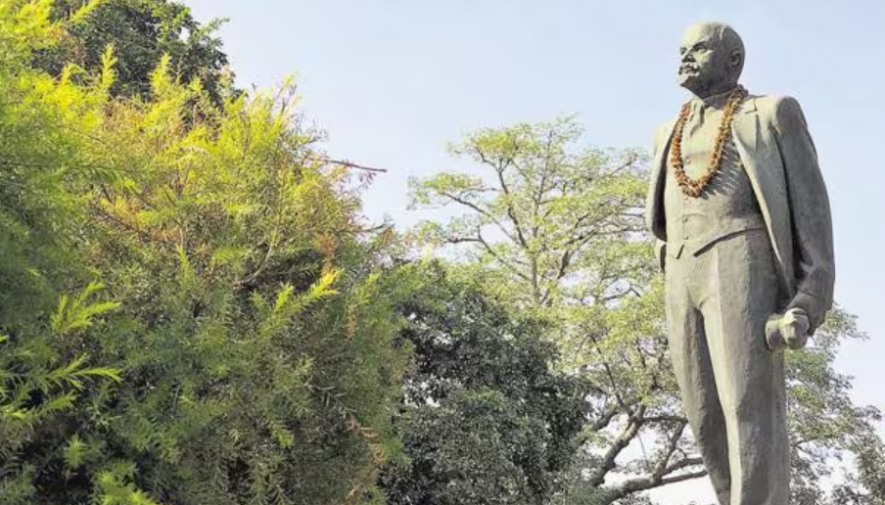Indian Freedom Fighters and Lenin's Enduring Legacy

Image credit: Hindustan Times
As part of their politics of appropriation, the Sangh Parivar is carrying forth an all-out attempt to appropriate India’s freedom struggle which, in reality, they did not participate in and to the contrary, opposed. As a part of this appropriation, they are repeatedly trying to spread canards about the communists and their role in the freedom struggle and rewrite history to erase it. This can be seen in the past attempts to remove communist martyrs such as the martyrs from Punnapra-Vayalar, Kayyur, Karivelloor, and Kavumbayi from the list of freedom fighters.
Another method of doing so has been to allege that since the most prominent figures of communism such as Lenin are not Indian, hence communism and Marxism are alien to India. This argument is completely baseless as the communist movement in India has grown so many of its own inspirational leaders and has adapted Marxism to the Indian landscape and further, has drawn from the legacy of various social reformers and movements. However, through the work of Dr. Leonid Mitrokhin titled Lenin and Indian Freedom Fighters, we can also see that Lenin and the Soviet Union had a direct connection to the Indian freedom struggle.
Dr. Mitrokhin was a prominent Soviet journalist and Indologist whose PhD work was on the “Influence of Great October Revolution on India’s Freedom Struggle.” He spent many years travelling across India, meeting many freedom fighters and gathering texts from the length and breadth of the country and has written many works on Indo-Soviet relations and allied themes.
He begins his book with the history of Professor Mohammad Barkatallah, an Indian freedom fighter and revolutionary democrat who served as the Prime Minister of the Provisional Government of Free India in Kabul. Barkatallah was in exile in Kabul when Amir Amanullah Khan came to power in February 1919 and declared the British Empire his enemy and called on representatives of all peoples of the East who were ready to fight against colonial domination and for independence to come to Afghanistan. Barkatallah met Lenin on May 7, 1919, and he was incredibly impressed by his meeting and his reading of the programme of the Communist Party. He witnessed revolutionary changes and the unprecedented enthusiasm of the working people of Soviet Russia. After this, Barkatallah became an ardent supporter of Lenin and the communists, despite not identifying himself as one. He said at the time of the meeting: “I am neither a communist nor a socialist. The goal of my life is to drive the British out of Asia. I am an uncompromising enemy of European capitalism in Asia, which is represented primarily by the British. In this, I am united with the communists and in this, we are natural allies.”
However, this sympathy for and the alliance with the communists was only to strengthen later. He later wrote in 1920: “Comrade Lenin has raised the banner of genuine freedom, equality and brotherhood. Let us join our ranks in the fight under that banner for the liberation of the entire human race. Follow the example of Lenin, who took the initiative to gain the hearts of the peoples of the East, and succeeded beyond any expectation.”
The book mentions several other revolutionaries such as Raja Mahendra Pratap, Moulana Obeidullah, Akbar Khan who was tried in the “Moscow- Tashkent Conspiracy” or the very first political trial held against anti-colonial fighters, Prithvi Singh Azad among others. All of them tell tales of the wonder of revolutionaries in exile who were welcomed into a country which had just had a successful revolution and was struggling against imperialist powers who wished the end of the first workers' state. All of them recount the affection and solidarity given to them by the Soviet state and the people and above all else, the understanding that Lenin had of the people of the East and the importance he placed upon the anti-colonial struggles.
No story exemplifies this more than Bhagat Singh’s. A young man was hanged by the British rulers at the young age of twenty-four. A man, who unlike the others mentioned above, had not stepped beyond the borders of then-British India. And yet, Lenin reached him or he reached Lenin through the medium of literature. In the last moments of their life, people turn to what is most dear to them. When Bhagat Singh was called to be hung, he told his executioners: “Wait a while. A revolutionary is talking to another revolutionary.” Bhagat Singh was reading Clara Zetkin’s Reminiscences of Lenin, and through the book, was in conversation with Lenin.
Leonid Mitrokhin’s perhaps forgotten book has many more details and interesting and inspiring stories which cannot be covered in a small review article such as this one. However, the most important enduring message of this book which cannot be wiped out is that Lenin was passionately concerned with the struggles for national liberation by the colonially oppressed. The state he was at the head of carried this concern in material terms as well. Lenin himself after his death turned into an ideological force representing the irresistible desire of peoples across the world for liberation from imperialism.
As the poet Langston Hughes wrote in his poem Lenin:
Lenin walks around the world.
Black, brown, and white receive him.
Language is no barrier.
The strangest tongues believe him.
In the second decade of the 21st century, Lenin has still not stopped his walk. His walk continues across the world as in India, in the struggles of farmers against big corporations and MNCs, of workers against pro-business labour codes and in the struggles of all downtrodden peoples for a better life.
The author is a PhD student at Jawaharlal Nehru University. The views expressed are personal.
No comments:
Post a Comment